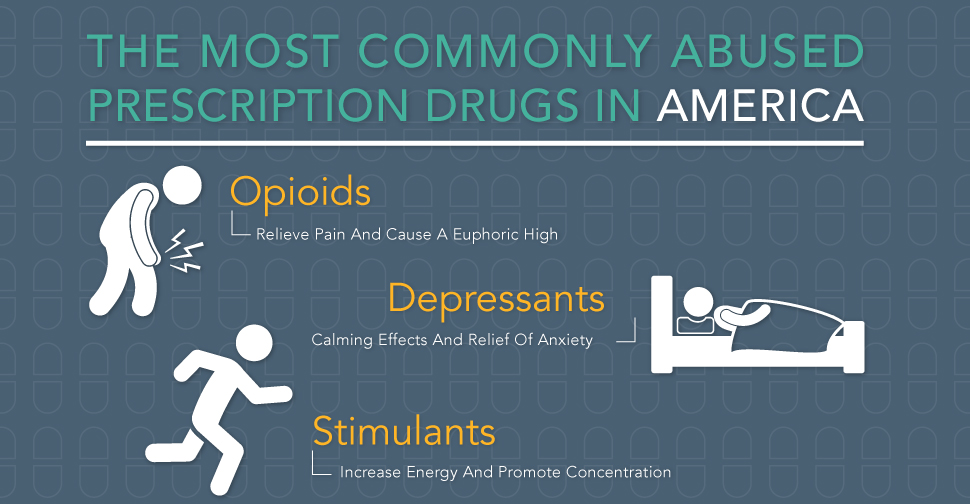
One of the largest drug abuse epidemics in America stems from over-prescription of medications, the theft and sale of prescription drugs, and the problematic use of medications not belonging to oneself, but to one who shares the same household. These medications fall under categories with derivatives contributing to the makeup of other illicit drugs, such as heroin, which makes it clear that regardless of a doctor’s prescription or an FDA approval, medications ARE drugs and are often addicting.
The causes of addiction vary from one user to the next, but many of those who are held under addiction’s spell have similar stories on what medication they abuse, why they feel they abuse it, and how they came to obtain so much of it. Much of the time, as the result of injury or surgery, a doctor will prescribe pain killers—opioids—to facilitate pain management during the healing process. Some doctors end up giving a patient more medication than needed and that triggers dependence. Whether the patient knows that they’re abusing and becoming addicted to a medication varies from one situation to the next, but the fact that too much is being given lends to the idea that the patient may never have explored the drug or become hooked on it had it not been given to them in such great volume.
Though many factors contribute to prescription drug addiction, and drugs other than those for pain are addicting as well, we do know that the types of drugs associated with this addiction in America can cause serious, life-threatening problems and lead to other, more potent versions of medications. Below are some of the most commonly abused prescription drugs in this country that often lead to addiction.
Opioids: The most abused opiods are codeine, morphine, methadone, fentanyl, and other pain relievers such as oxycodone and hydrocodone. Most of these are injected, swallowed, or snorted. These prescriptions medications relieve pain, cause a euphoric high, impair motor functions and coordination, cause nausea, sweating, drowsiness, confusion, and itching. They can also slow the breathing, lower blood pressure in a dangerous way, prompt comas, and cause death.
Some of these drugs are among the most powerful and lethal pain relievers, such as fentanyl which is 80-100 times stronger than morphine. Methadone is often used to treat opioid addiction, but can be abused and has properties that mute pain, as well.
Depressants: Barbituates, benzodiazepines, and sleep medications are commonly abused perscription depressants. Common barbituates are amytal, phenobarbital, seconal, and nembutal. “Benzos,” as they are called unclude Xanax, Valium, and Ativan. Other medications that cause similar effects are Ambien, Lunesta, and Sonata. All of these depressants are used for sedation, calming effects, drowsiness, and relief of anxiety. While they can help a user sleep or calm down during a panic attack, they are also addicting and cause slurred speech, dizziness, confusion, and a common loss of memory.
Many of these prescription medications can cause distress to the heart and lungs, especially during withdrawal and in conjunction with alcohol. Barbituates cause dangerous withdrawal effects that include high fevers.
Stimulants: The most commonly abused stimulants in America are amphetamines and methylphenidate. These include Adderal, Biphetamine, and Dexedrine; Concerta and Ritalin. These are medications commonly prescribed for ADHD and mental alertness. They may increase energy and promote concentration. They may also cause spiked heart rates, blood pressure, and reduced appetite. Even more serious, the abuse of these medications can prompt nervousness and insomnia, heart attack, seizures, and even stroke. Lasting effects include a possibility for tremors, complete loss of coordination, delirium, paranoia, hallucinations, aggressiveness, and digestive problems.
Seeking Help For Medication Dependence
 When all is said and done, dependence to medications such as these can end your life. Knowing how you’re being affected and what can happen to your future should you continue on this path is important. There are several treatment types available to those who struggle with prescription medication addiction, such as long-term rehabilitation and inpatient programs. Contact DrugRehab.org for assistance in beginning recovery today.
When all is said and done, dependence to medications such as these can end your life. Knowing how you’re being affected and what can happen to your future should you continue on this path is important. There are several treatment types available to those who struggle with prescription medication addiction, such as long-term rehabilitation and inpatient programs. Contact DrugRehab.org for assistance in beginning recovery today.

